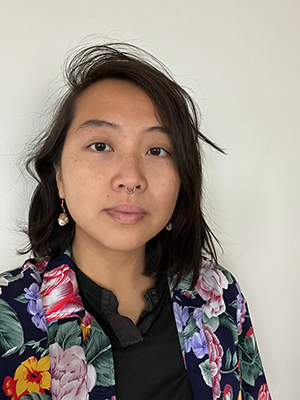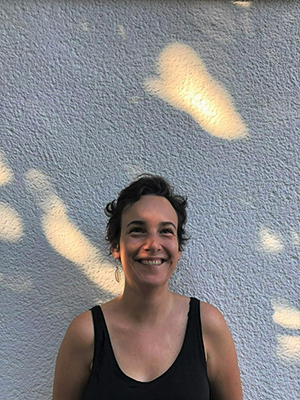Self & Family & Community:
Karla Hirsch interviews Jody Chan

Volunteer Karla Hirsch talks with Jody Chan, winner of our 2024 Open Season Fiction Award with "After, Words," featured in our spring issue #226. They discuss abolitionist movements, writing a short story via poetry, and how one’s principles, life, and fictions are indelibly intertwined.
Jody Chan is a writer, drummer, community organizer, and care worker based in Toronto/Tkaronto. They are the author of sick (Black Lawrence Press), winner of the 2021 Trillium Award for Poetry, and impact statement (Brick Books). Jody is a performing and teaching member with RAW Taiko Drummers, an editorial board member of Midnight Sun Magazine, and the 2023-2024 Artist-in-Residence at the University of Toronto’s Queer and Trans Research Lab. They can be found at dog parks, in libraries, and online at https://www.jodychan.com/. They believe community is an action. They believe in radical imagination as a learnable and necessary skill. They believe in collective liberation.
First of all, congratulations on winning the 2024 Open Season Fiction Award! I loved your story so much and was incredibly moved by it. I found all three of the mourners to have not only a distinct character, but their own language—which made this short piece even more dense and enduring. Could you talk a little about how you approached these three characters and their very individual forms and expressions of grief?
Thank you so much for reading my story, and for these generous, attentive questions— it’s a gift to get to think about them!
I came to fiction as a poet first, meaning: I don’t really know how to write a linear narrative! Linear is not how I live. I recognized myself in poetry because of its impulse to collapse, or compress, time and space and emotion, how it mirrored a process in my own thinking, a particular relationship to reality—a madness. With this piece, I was curious about fiction’s capacity for what seemed, to me, like the opposite: to allow a single moment, a single corner of a feeling, to expand into a whole world. I tricked myself, basically, into writing a prose poem; working out that grief on the level of the line, line after line, eventually accumulating into something like a short story.
I embedded myself in the three characters’ very different relationships with Mei, and allowed the language of their grief to emerge from there. V’s grief, a moody spiral; Popo’s grief, a walk into the endless past; Ah Ma’s grief, a force field pushing outward.
I was trying not to be didactic (though, as the poet Solmaz Sharif says, there is a certain amount of telling involved in all writing, unless you assume a total sameness with the reader; and where does that instruction, not to be overtly instructive or principled or ideological, come from anyway?) and yet to have a really clear anti-carceral and abolitionist orientation to suicide and suicidality: to render suicide inside of its social and political contexts, and to take the utmost care I could with Mei’s life. It was important to me that none of the three characters would shame or pathologize Mei; regardless of the discomfort, heartbreak, lack of understanding, whatever, they might feel with regard to her choices. Grief, anger, hurt, disappointment, abandonment—yes, of course—but not shame, or accusation, or moralizing. All of this was informed by my own fraught relationship with suicidality, and by disability justice and abolitionist movements.
I have a weakness for the right punch of an opening line—especially in fiction—and yours is an amazing entry point to the story. It’s beautifully restrained and at the same time bursting with emotion, pulling the reader right in. This goes for the entire first two paragraphs, actually, and I think a part of that effect stems from the very concise imagery and the short lines. Could you talk a little about the opening and the conscious choices you made here? How did the lines come to you?
In that first line, I try to enter the story the same way V does. Abruptly, pragmatically, with my whole body—and with the knowledge that whatever comes after must refer back to that moment. In my experience, when faced with a crisis, I go into a dissociative mode, where emotions register in a subterranean way, rather than being explicitly stated or forefronted. It’s hard to return to that moment, except through unexpected sensory details, fragmented thoughts, flashes of memory. I asked myself lots of questions, in trying to represent this mode of consciousness. How can I allow V the privacy of their own emotion, even for just one moment, before they open the door? Where do I leave just enough space for the reader to make contact with V (“I bring myself to this story”), without suggesting that they might substitute V’s primary experience of grief with their own (“I know exactly how that feels”)? What is the shape of V and Mei’s lives together, what is the shape of this moment; what is the rhythm it calls for?
Fiction contest judge Deepa Rajagopalan said about your story: “It takes brilliance and skill to tell such a story in the second person without disorienting the reader even momentarily.” I agree and I think you’ve used the second person wonderfully and unconventionally in that it’s actually a fourth character—that of Mei—and even though they have no agency, their presence is strong and all-embracing. What led you to writing this almost like a letter? What were the choices you made along the way to use this narrative perspective?
In “Hate Kills: A Social Justice Response to ‘Suicide,’” Vikki Reynolds writes about the importance of breaking down individualistic frameworks for understanding suicide—not to pathologize, internalize, or depoliticize suicide, but rather to keep in our awareness the full contexts of abandonment, violence, injustice, that actually produce death. At the same time, I don’t want to lose the individual.
I’m drawn to the second person because, to me, it’s so intimate, immediate, sensual, erotic—how the epistolary form tries to reach across distance, how that trying feels so active. (I’m thinking here of Sanna Wani’s “Distances” poems, in her book My Grief, The Sun.)
I didn’t want to sensationalize Mei’s death, or centre the story around voyeuristic questions of how she killed herself, or scrutinize her decision. Instead, I wanted to ask the people who loved her: what did knowing Mei mean to you? How will you honour her—her quirks, her habits, her desires, her politics—through your continued living?
I want to state clearly, too, that Mei does have agency. She had agency when she decided she no longer wanted to live, she had agency when she exercised her bodily autonomy, she had agency when she told V, long before the events of this story, that she didn’t see a cop or a psych ward as a reasonable response to her suicidality.
Your story touches not only on themes of guilt and grief but, connected to those, on community, on identity and—I found most poignantly—on a personal, necessary emancipation, the growing of one’s own life, at times at the expense of our relationships. How relevant was this to you in the process of writing this piece? How much were these themes at the foreground when you began writing and how much did they grow from the actual process of creating this piece?
The contradictions, or sharp tensions, between self and family and community were really central to me when I was imagining the third section, which is written from the perspective of Mei’s Ah Ma. Her perspective is the one I was most anxious to inhabit. I’ve lost, or been willing to lose, more than one relationship because of political disagreements; which, to me, are disagreements about how to live and what matters. I have weighed one form of caregiving against another. I try to keep a polyamorous sensibility about all of this—that love grows love, whether for an individual or a wider collective—but there are always the constraints of time and capacity. If I’m going to the protest, I might not be able to bring you soup, for example. I love how you’ve named it here, “the growing of one’s own life.” Capitalism conditions us to locate that growth in the accumulation of wealth, or the consolidation of nuclear family bonds. But I’m more interested in the potentials, the promises, the disappointments, the desires, the betrayals, the joys of other kinds of solidarities. I don’t think it’s romantic to believe that one’s own life can only be grown in relationship to the collective; that no one is free until we are all free.
What’s a recent fictional discovery that has truly impressed you? Maybe a writer or a book or story that resonated with you more deeply than you anticipated?
I’m part of a reading group that recently read and discussed Ghassan Kanafani’s collection of stories, Men in the Sun. Ghassan Kanafani was a Palestinian writer and revolutionary. He was martyred by Zionist forces in 1972, along with his niece Lamees. I continue to be haunted by the resonances between the violences Kanafani described in Men in the Sun, in particular the story “Letter from Gaza,” and Israel’s current escalation of genocide in Palestine. (On haunting, to quote Avery Gordon’s Ghostly Matters: “To look for lessons about haunting when there are thousands of ghosts; when entire societies become haunted by terrible deeds that are systematically occurring and are simultaneously denied by every public organ of governance and communication…when people you know or love are there one minute and gone the next…”)
According to Kanafani’s sister, the day before they were killed together, Lamees had asked her uncle to focus more on his writing, rather than his revolutionary activities. He responded: “Go back to writing stories? I write well because I believe in a cause, in principles. The day I leave these principles, my stories will become empty. If I were to leave behind my principles, you yourself would not respect me.”
I’ve been thinking about Kanafani’s words every day since I read them for the first time. That one’s principles, and one’s life, and one’s fictions, are indelibly intertwined.

Karla Hirsch









